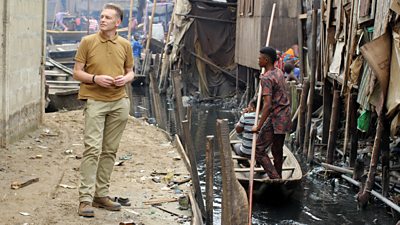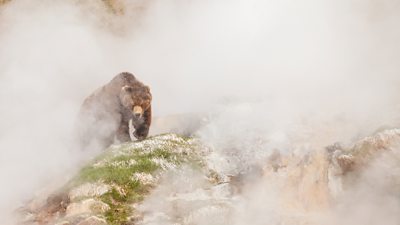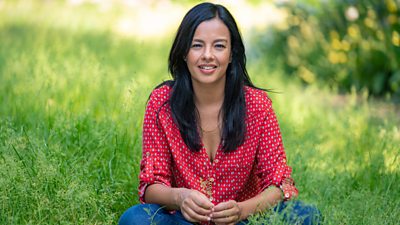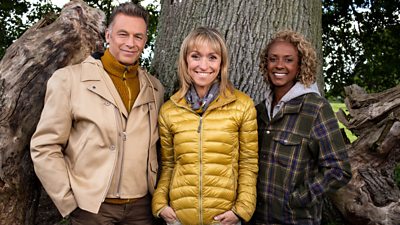Protecting Our Planet
At an event this evening to celebrate the ΒιΆΉΤΌΕΔ’s factual content, Alison Kirkham, ΒιΆΉΤΌΕΔ Controller Factual Commissioning, gave an impassioned speech outlining her plans for the years ahead.

Green Planet (w/t) will be the first immersive portrayal of an unseen, inter-connected world, full of remarkable new behaviour, emotional stories and surprising heroes in the plant world. This is Planet Earth from the perspective of plants.
Using brand new technological advances and over two decades of new discoveries, we take the viewer on a journey into a magical world.
We discover that plants are as aggressive, competitive and dramatic as animals - locked in desperate battles for food, for light, to reproduce and to scatter their young. They are social - they communicate with each other, they care for their young, they help their weak and injured. They can plan, they can count, they can remember.
Plants are the stars of this series but there will also be box-office animals - plants are the arch-manipulators of the natural world. They bend the actions and lives of animals, including ourselves, to their own ends.
We will use new developments in robotics, moving time-lapse, super-detail thermal cameras, deep focus ‘frame-stacking’ and ultra-high-speed to travel beyond the power of the human eye and make visible the amazing, hidden life of the green planet.
Green Planet (w/t) a 5x60’ series for ΒιΆΉΤΌΕΔ One and PBS, is made by ΒιΆΉΤΌΕΔ Studios Natural History Unit. The Executive Producer is Mike Gunton. It was commissioned by Charlotte Moore, Director, ΒιΆΉΤΌΕΔ Content and Tom McDonald, Head of Commissioning, Natural History and Specialist Factual. For PBS the series is overseen by Bill Gardner, Vice President, Programming and Development. It was co-produced by The Open University.
One Planet, Seven Worlds (w/t)

One Planet, Seven Worlds (w/t) is a brand new, ambitious landmark series for ΒιΆΉΤΌΕΔ One, presented by Sir David Attenborough.
Each one-hour episode will transport viewers to a single continent and tell the story of its spectacular wildlife and iconic landscapes.
Millions of years ago incredible forces ripped apart the Earth’s crust creating seven extraordinary continents. This series will reveal how each distinct continent has shaped the unique animal life found there.
We will discover why Australasia is full of peculiar and venomous wildlife; why North America is a land of opportunity where pioneers succeed; and what the consequences are for life racing to compete on the richest of all continents, South America.
The series will feature remarkable, new animal behaviour from all the continents including the baking plains of Africa and the frozen waters off Antarctica.
In Asia, the biggest of all continents, we will showcase life at the extremes, whilst in Europe we will reveal surprising wildlife dramas hidden right alongside us.
The series will celebrate the diversity of life on each of these continents, but also the many challenges faced by animals in a modern world dominated by humanity.
Epic landscapes and intimate behaviour have been filmed using the very latest techniques, allowing audiences to experience each continent like never before. By telling unknown, unseen and unexpected wildlife stories, we will uncover the fundamental truth about what makes each one of our seven worlds unique.
By telling unknown, unseen and unexpected wildlife stories, we will uncover the fundamental truth about what makes each one of our seven worlds unique.
One Planet, Seven Worlds (w/t), a 7x60’ series for ΒιΆΉΤΌΕΔ One, is made by ΒιΆΉΤΌΕΔ Studios Natural History Unit, co-produced with ΒιΆΉΤΌΕΔ America, Tencent Penguin Pictures, ZDF and France Télévisions. The Executive Producer is Jonny Keeling. It was commissioned by Charlotte Moore, Director, ΒιΆΉΤΌΕΔ Content and Tom McDonald, Head of Commissioning, Natural History and Specialist Factual.
Population With Chris Packham (w/t)
Population forecasts suggest we are heading for a world of 10 billion people by 2050 - and many believe that this figure is unsustainable for our planet.
Naturalist and presenter Chris Packham (main picture) has chosen not to have children. In this investigative film, Chris is going to ask uncomfortable questions that challenge the very foundations of our societies, as he attempts to discover just how we might stabilise the worldwide birth-rate.
What does a world of 10 billion people look like, and what pressures would it put on resources? Can population growth truly be halted - and if so, what would not raising children mean for our place and our purpose on Earth?
Chris asks one of the most controversial and important question of our time: for the sake of the planet and our own survival, is it time we stopped reproducing?
Population With Chris Packham (w/t), a 1x60’ for ΒιΆΉΤΌΕΔ Two, is made by Curious Films and the ΒιΆΉΤΌΕΔ Studios Science Unit. The Executive Producer for ΒιΆΉΤΌΕΔ Studios is Helen Thomas and for Curious is Dov Freedman. The Director is Charlie Russell (Asperger’s and Me). It was commissioned by Patrick Holland, Controller, ΒιΆΉΤΌΕΔ Two, and Tom McDonald, Head of Commissioning, Natural History and Specialist Factual. The Commissioning Editor is Craig Hunter. It will form part of the Horizon strand.
Meat: A Threat To Planet Earth (w/t)

Following on from the success of ΒιΆΉΤΌΕΔ One’s Drowning In Plastic, Liz Bonnin will investigate a new and shocking environmental crisis. The UN has recently branded meat “the world’s most urgent problem” stating that our excessive meat consumption is pushing us to a climate catastrophe.
In this ground-breaking film, presenter Liz Bonnin, will embark on an ambitious and sometimes dangerous mission to discover the true impact of meat on our planet.
In the Amazon rainforest, Liz will join zoologists who are urgently trying to save rare animal and plant species whose habitat is being cleared for cattle. She’ll travel to Chinese 'super farms’ to understand the colossal growth of the meat industry, and the harrowing predictions of its effect on our planet's climate and resources. And in the US and Europe, Liz will investigate how humans can continue to eat meat - how to rear it, how to feed it, how to graze it - without killing our planet.
On her travels, she’ll meet characters on all sides of the debate; dieticians who believe that meat is an essential part of our lives; environmentalists drawing a road map to a meat-free world; and food scientists developing 'frankenfood' meatless alternatives to our every-day meals. The film will be a fascinating investigation into the global meat industry, our health and a planet’s ecosystem on the brink of collapse.
Meat: A Threat To Planet Earth (w/t), a 1x60’ for ΒιΆΉΤΌΕΔ One, is made by RAW TV. Executive Producer is Tom Watt-Smith. It was commissioned by Charlotte Moore, Director, ΒιΆΉΤΌΕΔ Content and Tom McDonald, Head of Commissioning, Natural History and Specialist Factual. The Commissioning Editor is Craig Hunter.
The Springwatch Year Of Action

The Springwatch Year Of Action is being launched in 2019 to look at the threat to our British wildlife.
The first State of Nature Report, published in 2013, revealed that 56% of all UK species are in decline. The third edition, due later this year and compiled by over 50 conservation and research organisations, will update on the continuing declines.
But the message from many conservation agencies is that - in order to understand and start to reverse these worrying declines - scientists need far more data and that is where Springwatch viewers can help.
This year, from Springwatch 2019, The Watches are calling on viewers to help carry out one of the largest citizen science projects ever attempted, in The Springwatch Year Of Action - an initiative that will ask the public to undertake an easy, nature-related quest every week in order to collect data that will help to create the most accurate picture of the health of our UK wildlife.
Viewers will be asked to spot, photograph and record sightings in a series of Weekend Watches, on woodland walks, coastal breaks and most importantly right on their doorsteps.
The project will culminate during Springwatch 2020 with a giant Garden Watch, designed in conjunction with the British Trust for Ornithology and other Springwatch partners. The data collected here will give conservationists a comprehensive idea of what is in our nation’s gardens.
Gardens are important because this is where information is most scarce. These private spaces cover three times more land than all the British national nature reserves combined, so more than ever it is vital to understand what they currently offer to our wildlife, and what they could offer with a few small changes.